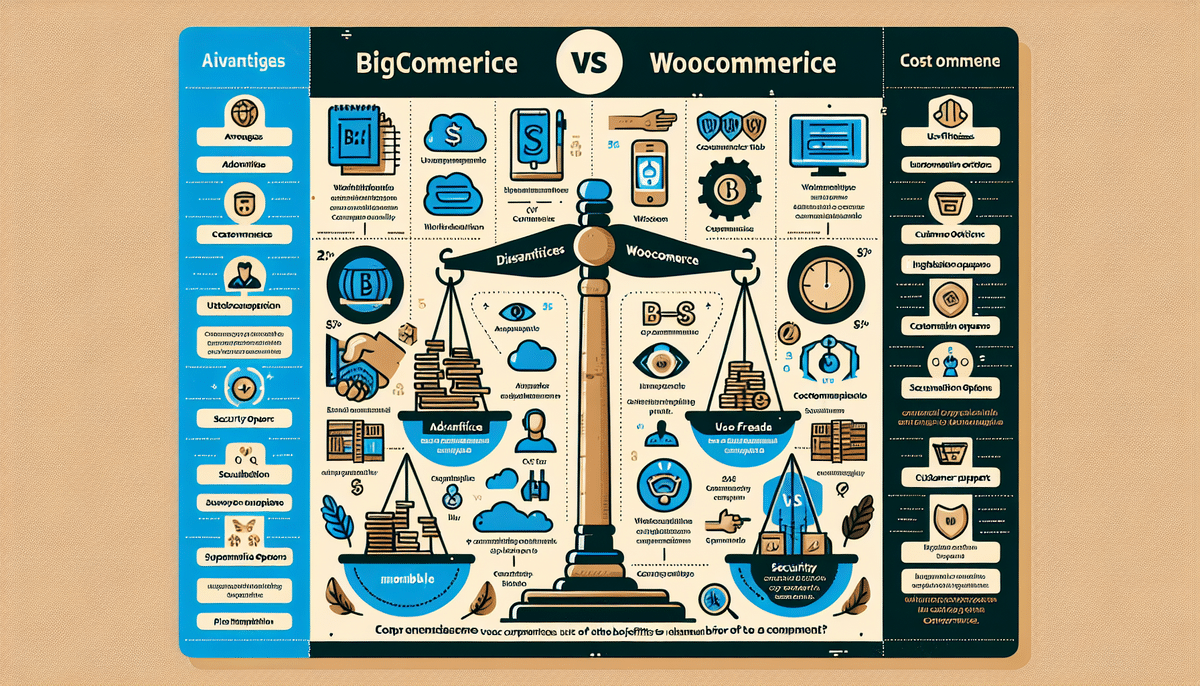WooCommerce vs eBay: Which eCommerce Platform is Right for You?
If you’re planning to start an online business and wondering which eCommerce platform will work best for you, you have probably stumbled across the big names of the eCommerce industry—WooCommerce and eBay. These platforms have been around for several years and have garnered a reputation as the go-to platforms for running an online business. However, selecting the right platform from these two giants can be a daunting task. In this article, we will compare the features, pricing, ease of use, customization options, payment and shipping options, security and fraud prevention, customer support, and SEO optimization of WooCommerce and eBay. This comparison will help you choose the perfect eCommerce platform for your business based on your priorities and budget.
Understanding the eCommerce Landscape
Before diving into the comparison of WooCommerce and eBay, it's essential to grasp the current eCommerce landscape. eCommerce, or Electronic Commerce, refers to any business transaction conducted online. As of 2023, global retail e-commerce sales have surpassed $6.54 trillion, reflecting a steady growth trajectory driven by increasing internet penetration and changing consumer behaviors (Statista). This surge presents vast opportunities for entrepreneurs to establish and expand their online presence.
One of the primary advantages of eCommerce is the ability to reach a global audience. Unlike traditional brick-and-mortar stores limited by geographic boundaries, online businesses can cater to customers worldwide, significantly expanding their market reach and potential revenue streams.
Additionally, eCommerce enables businesses to collect and analyze customer data using advanced analytics tools. This data includes customer behavior, preferences, and purchase history, which can be leveraged to enhance marketing strategies, personalize customer experiences, and boost sales. Many eCommerce platforms, including WooCommerce and eBay, offer built-in analytics tools to facilitate this data-driven approach.
What is WooCommerce?
WooCommerce is an open-source, free plugin designed for WordPress, enabling users to create and manage online stores with ease. Renowned for its user-friendly interface, robust functionality, and flexibility, WooCommerce powers over 5 million websites worldwide, making it one of the most popular eCommerce platforms available.
One of WooCommerce's standout features is its extensive range of plugins and extensions. These add-ons allow users to tailor their online stores to specific needs, including payment gateways, shipping options, product variations, and more. This level of customization ensures that store owners can create a unique and personalized shopping experience for their customers.
Another significant advantage of WooCommerce is its strong community support. A large and active community of developers, users, and experts contributes to the platform's continuous improvement, offering assistance and developing new plugins, extensions, and features to keep WooCommerce at the forefront of eCommerce technology.
What is eBay?
eBay is a global online marketplace founded in 1995, providing a platform for individuals and businesses to buy and sell a vast array of goods and services. With approximately 185 million active buyers worldwide, eBay stands as one of the largest and most recognized online marketplaces.
Distinct from platforms like WooCommerce, eBay operates as a third-party marketplace rather than a standalone eCommerce solution. It offers unique features such as auction-style listings, where sellers can set starting bids and buyers place bids until the auction concludes. Additionally, eBay provides a "Buy It Now" option for sellers preferring fixed prices, catering to diverse selling preferences.
Beyond physical goods, eBay also facilitates the sale of digital products, including software, music, and e-books. This versatility makes eBay an attractive platform for both small businesses and individual sellers looking to reach a broad audience without the need for managing their own website.
Comprehensive Comparison: WooCommerce vs eBay
Features
Both WooCommerce and eBay offer a robust set of features to support online selling. WooCommerce provides comprehensive product management, order management, shipping and tax calculations, coupon and discount management, and multiple payment gateway integrations. Additionally, its plugin repository offers countless add-ons to extend functionality, such as advanced inventory management, marketing tools, and customer engagement features.
Conversely, eBay comes with built-in features like listing tools, inventory management, shipping and tax management, and seller protection policies. These tools streamline the selling process, allowing sellers to manage their listings efficiently without the need for extensive customization.
Pricing
WooCommerce is free to download and use, but costs may arise from hosting, domain registration, and premium plugins or themes. This model often results in lower overall costs compared to hosted eCommerce solutions. For example, Shopify, another popular platform, charges a monthly fee that can add up over time.
eBay, on the other hand, operates on a fee-based model, charging listing fees, final value fees, and optional fees for enhanced seller tools like shipping and tracking. While eBay's fees are generally higher, the platform's vast built-in audience can compensate by potentially driving higher sales volumes.
Ease of Use
WooCommerce, being built on WordPress, offers a familiar interface for those accustomed to content management systems. However, it has a steeper learning curve for complete beginners. With time and exploration, users can harness its full potential.
eBay boasts an intuitive and user-friendly interface, making it an excellent choice for beginners who want to start selling quickly without dealing with the complexities of setting up and managing a separate website.
Customization Options
WooCommerce excels in customization, granting full access to its source code. This allows store owners to modify and enhance their stores to meet specific business requirements. The extensive library of themes and plugins further facilitates a personalized shopping experience.
In contrast, eBay offers limited customization options. Sellers are confined to the platform's templates and predefined settings, which can restrict the ability to create a unique brand identity.
Payment and Shipping Options
WooCommerce supports multiple payment gateways, including PayPal, Stripe, and Square, among others. It also integrates with popular shipping carriers like UPS, FedEx, and USPS, providing comprehensive solutions for both payments and logistics.
eBay offers a variety of payment options, including debit and credit cards, and PayPal. Additionally, eBay has its own shipping service, eBay Delivery, in partnership with major carriers like USPS, FedEx, and UPS, simplifying the shipping process for sellers.
Security and Fraud Prevention
WooCommerce includes built-in security features and supports plugins that enhance fraud prevention. Features such as Secure Socket Layer (SSL) encryption and Two-Factor Authentication ensure secure transactions and protect sensitive data.
eBay employs a comprehensive rating system to foster trust between buyers and sellers. It also offers seller protection policies to safeguard against fraudulent activities, adding an extra layer of security for its users.
Customer Support
WooCommerce provides extensive support through its documentation, knowledge base, and community forums. Additionally, official support is available via email, ensuring that users can find assistance when needed.
eBay offers customer support through multiple channels, including phone, email, and live chat, providing timely help to sellers facing issues or requiring guidance.
SEO Optimization
WooCommerce is renowned for its SEO-friendly architecture. It offers numerous SEO plugins and tools that help optimize product listings and store performance for search engines, enhancing visibility and driving organic traffic.
eBay's SEO capabilities are somewhat limited due to its platform constraints. While listings can be optimized to an extent, the ability to perform extensive SEO customization is restricted compared to standalone platforms like WooCommerce.
Pros and Cons of Using WooCommerce
Pros:
- Flexible payment and shipping options
- Excellent customization capabilities
- Lower ongoing costs
- Powerful SEO tools
- Vast community support
Cons:
- Steeper learning curve for beginners
- Requires separate hosting and domain setup
- Potential additional costs for premium plugins
Pros and Cons of Using eBay
Pros:
- Built-in large audience and traffic
- User-friendly interface ideal for beginners
- Comprehensive built-in selling tools
- Seller protection policies enhance security
Cons:
- Higher fees compared to WooCommerce
- Limited customization options
- Less control over SEO optimization
Choosing the Right Platform for Your Business
For Small Businesses
WooCommerce is ideal for small businesses seeking maximum customization, lower ongoing costs, and robust SEO capabilities. Its flexibility allows small businesses to create a tailored online presence that can grow with their needs.
For Large Businesses
eBay is better suited for large businesses that can benefit from its vast built-in audience and streamlined selling processes. The platform's extensive reach can help large enterprises quickly scale their operations without the need to manage their own website infrastructure.
Selling Physical vs Digital Products
Both platforms support the sale of physical products effectively. However, eBay is preferable for sellers aiming to tap into a broader audience without the complexities of managing a separate storefront. For digital products, WooCommerce stands out by offering specialized plugins and tools that facilitate secure and efficient digital product management, providing a superior user experience for buyers.
Conclusion: Selecting the Optimal eCommerce Platform for Your Needs
Choosing the right eCommerce platform hinges on various factors, including business size, budget, product type, and desired level of customization. WooCommerce offers unparalleled flexibility, extensive customization options, and cost-effectiveness, making it an excellent choice for small to medium-sized businesses looking to build a unique online presence. On the other hand, eBay provides a user-friendly, high-traffic marketplace ideal for larger businesses seeking to leverage a built-in audience and streamline their selling processes.
Ultimately, both WooCommerce and eBay are powerful eCommerce solutions, each with its strengths and limitations. Assessing your specific business needs and priorities will guide you in making an informed decision that best supports your online business endeavors.
Final Thoughts on WooCommerce vs eBay
In conclusion, WooCommerce and eBay each offer distinct advantages tailored to different types of businesses. WooCommerce excels in providing a customizable, SEO-friendly platform suitable for businesses that desire full control over their online store. Conversely, eBay's extensive reach and ease of use make it an attractive option for businesses aiming to quickly establish a presence in a competitive marketplace without the need for extensive technical management.
When evaluating these platforms, consider factors such as your target audience, product types, budget constraints, and long-term business goals. By aligning these elements with the strengths of WooCommerce or eBay, you can select the eCommerce platform that best facilitates your business growth and success.






















